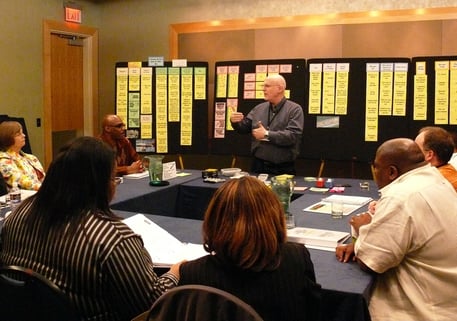How Organizations Benefit From Our Father Engagement Experience™
2 min read
Date Published: 10/23/2017
Last Updated: 01/03/2018
National Fatherhood Initiative Blog / Latest Articles
2 min read


The Father Engagement Experience™ (FEE) has helped many organizations develop concise, accountable plans that address their unique organizational culture, challenges, and resources.
This two-day, in-person strategic planning session facilitated by National Fatherhood Initiative (NFI) uses a structured process (e.g. storyboards, Pure Form Thinking, and multi-voting) to help organizations establish goals and identify father-engagement strategies. NFI facilitators further assist by providing insight and recommendations drawn from 23 years of experience partnering with thousands of organizations.
The session results in a customized Father Engagement Game Plan™ (FEGP) that any organization can use to accomplish great things around responsible fatherhood.
In the last two years, I’ve had the privilege to facilitate our Father Engagement Experience™ (FEE) with Healthy Families Florida (HFF), the Tracy Family Foundation (TFF), the Tennessee Department of Human Services (DHS), and the Kentucky Department for Children and Families (DCF). As a result of these experiences, I’ve noticed some common ways these groups have benefitted. Some of the ways include:
Kansas DCF and Healthy Families Florida, for example, integrated NFI’s Father-Readiness Network Assessment™ (FRNA) into their action plans. The FRNA uses an online version of NFI’s Father Friendly Check-Up™ (FFCU) to assess multiple sites, offices, or partners within a larger network. As a result, Kansas DCF learned how father-friendliness varies between the four regions of the state (e.g. Kansas City, Wichita, East, West), by staff type (e.g. DCF staff, contractors), and by program type (e.g. Prevention and Protection Services, Economic and Employee Services). HFA learned how father-friendliness varies by program type (e.g. Healthy Families, Healthy Start, Maternal, Infant & Early Childhood Home Visiting) and by length of employee’s service. This data has informed their statewide fatherhood plans and allowed them to address issues and explore opportunities they wouldn’t have known about otherwise.
I have seen how the FEE has helped these organizations create large-scale fatherhood action plans that achieved their goals and objectives. I would love for you to experience better outcomes in your work with fathers and families as well.
Have you developed a strategic plan to more effectively engage fathers in your work?
What do you stand to lose by not using the FEE to take your organization’s father-engagement work to the next level?
Date Published: 10/23/2017
Last Updated: 01/03/2018
Download this free guide for a proven 7-step roadmap—from making the case and securing funding for your program, to launching and measuring real results!


Train Your Staff
Fatherhood Programs
Fatherhood Data
© 2026 National Fatherhood Initiative®. All rights reserved.